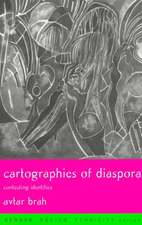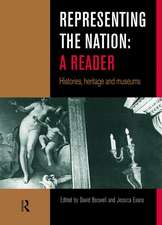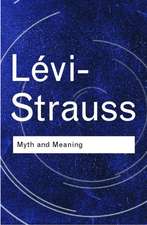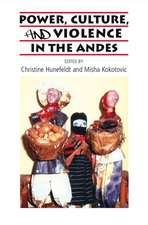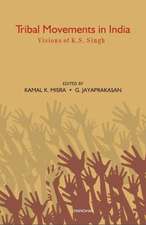The Reinvention of Primitive Society: Transformations of a Myth: Routledge Classic Texts in Anthropology
Autor Adam Kuperen Limba Engleză Paperback – 14 feb 2017
By way of fascinating account of classic texts in anthropology, ancient history and law, Kuper reveals how this myth underpinned academic research and inspired political programmes. Its ancestry is traced back to classical western beliefs about barbarians and savages, and Kuper also tackles the latest version of the myth, the idea of a global identity of “indigenous peoples”.
The Reinvention of Primitive Society is a key text in the history of anthropology, and will interest anyone who has puzzled about the very idea of “primitive society” – and so, by implication, about “civilisation”.
| Toate formatele și edițiile | Preț | Express |
|---|---|---|
| Paperback (2) | 386.51 lei 6-8 săpt. | |
| Taylor & Francis – 14 feb 2017 | 386.51 lei 6-8 săpt. | |
| Taylor & Francis – 23 iun 2005 | 417.36 lei 6-8 săpt. | |
| Hardback (2) | 934.94 lei 3-5 săpt. | +20.62 lei 6-12 zile |
| Taylor & Francis – 14 feb 2017 | 934.94 lei 3-5 săpt. | +20.62 lei 6-12 zile |
| Taylor & Francis – 23 iun 2005 | 1165.20 lei 6-8 săpt. |
Preț: 386.51 lei
Nou
Puncte Express: 580
Preț estimativ în valută:
73.97€ • 77.13$ • 61.47£
73.97€ • 77.13$ • 61.47£
Carte tipărită la comandă
Livrare economică 21 martie-04 aprilie
Preluare comenzi: 021 569.72.76
Specificații
ISBN-13: 9781138282650
ISBN-10: 1138282650
Pagini: 236
Dimensiuni: 156 x 234 x 13 mm
Greutate: 0.39 kg
Ediția:1
Editura: Taylor & Francis
Colecția Routledge
Seria Routledge Classic Texts in Anthropology
Locul publicării:Oxford, United Kingdom
ISBN-10: 1138282650
Pagini: 236
Dimensiuni: 156 x 234 x 13 mm
Greutate: 0.39 kg
Ediția:1
Editura: Taylor & Francis
Colecția Routledge
Seria Routledge Classic Texts in Anthropology
Locul publicării:Oxford, United Kingdom
Public țintă
Postgraduate and UndergraduateCuprins
PART ONE: THE IDEA OF PRIMITIVE SOCIETY
1. The Myth of Primitive Society
2. Barbarian, Savage, Primitive
PART TWO: ANCIENT LAW, ANCIENT SOCIETY AND TOTEMISM
3. Henry Maine’s Patriarchal Theory
4. Lewis Henry Morgan and Ancient Society
5. The Question of Totemism
PART THREE: EVOLUTION AND DIFFUSION – BOAS, RIVERS AND RADCLIFFE-BROWN
6. The Boasians and the Critique of Evolutionism
7. From Rivers to Radcliffe-Brown
PART FOUR: DESCENT AND ALLIANCE
8. Descent Theory: a Phoenix From the Ashes
9. Towards the Intellect: Alliance Theory and Totemism
PART FIVE: BACK TO THE BEGINNING
10. The return of the native
11. Conclusion
1. The Myth of Primitive Society
2. Barbarian, Savage, Primitive
PART TWO: ANCIENT LAW, ANCIENT SOCIETY AND TOTEMISM
3. Henry Maine’s Patriarchal Theory
4. Lewis Henry Morgan and Ancient Society
5. The Question of Totemism
PART THREE: EVOLUTION AND DIFFUSION – BOAS, RIVERS AND RADCLIFFE-BROWN
6. The Boasians and the Critique of Evolutionism
7. From Rivers to Radcliffe-Brown
PART FOUR: DESCENT AND ALLIANCE
8. Descent Theory: a Phoenix From the Ashes
9. Towards the Intellect: Alliance Theory and Totemism
PART FIVE: BACK TO THE BEGINNING
10. The return of the native
11. Conclusion
Descriere
The Reinvention of Primitive Society critiques ideas about the origins of society and religion that have been hotly debated since Darwin. Tracing interpretations of the barbarian, savage and primitive back through the centuries to ancient Greece, Kuper challenges the myth of primitive society, a concept revived in its current form by the modern indigenous peoples’ movement: tapping into widespread popular beliefs regarding the noble savage and reflecting a romantic reaction against ‘civilisation’ and ‘science’. Through a fascinating analysis of seminal works in anthropology, classical studies and law, this book reveals how wholly mistaken theories can become the basis for academic research and political programmes. Lucidly written and highly influential since first publication, it is a must-have text for those interested in anthropological theory and post-colonial debates.
Notă biografică
Adam Kuper is Professor of Anthropology at Brunel University, UK and a Fellow of the British Academy. He is the author of a number of books, including The Chosen Primate: Human Nature and Cultural Diversity (Harvard 1994), Anthropologists and Anthropology: The Modern British School, third edition (Routledge 1996) and Culture: The Anthropologists' Account (Harvard 1999). The founding president of the European Association of Social Anthropologists, he ws for many years editor of Current Anthropology, and is co-editor of The Social Science Encyclopedia, third edition (Routledge 2003).







